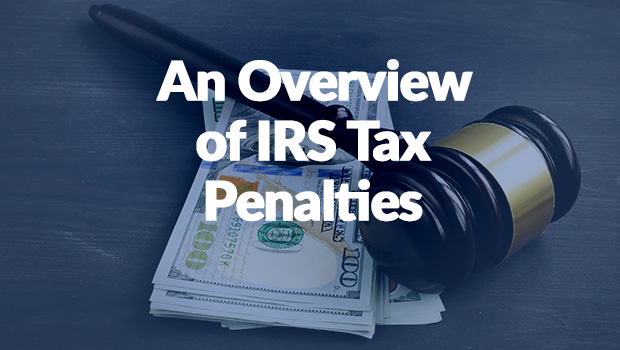Getting in trouble with the IRS is not a fun experience. If you’re lucky, the only thing you’ll lose is your time (and maybe a little sanity). If you’re unlucky, you might have to pay some hefty monetary penalties to the IRS for unpaid taxes. In this blog post, we’ll examine why you might have to pay a penalty to the IRS. We’ll also look at ways to avoid having to pay tax penalties.
IRS Penalty Causes
There might be as many reasons for paying an IRS tax penalty as there are types of taxes the IRS collects. Below are some of the potential reasons you might have to pay an IRS tax penalty:
- Not filing a tax return by the deadline.
- Not paying income taxes owed by the deadline.
- Claiming a deduction or tax credit you’re not eligible for.
- Claiming a bigger tax credit than you’re entitled to.
- Paying your taxes with a check that bounces.
- Not paying quarterly estimated taxes accurately or on time.
- Not correctly and timely disclosing financial activity from overseas.
There are other potential reasons you or another taxpayer might have to pay a penalty to the IRS, but these are some of the most common triggers for an IRS tax penalty payment.
The IRS imposes both interest and penalties on taxpayers. It’s important to understand that IRS tax penalties and interest are not identical. In the event that you fail to pay your taxes or penalties by the designated deadline, you may be subject to paying interest to the IRS. This interest will be accumulated and added to your outstanding tax bill or IRS penalty. The specific amount of interest you will be charged is contingent upon the sum owed, the particular penalty type (as different penalties begin accruing interest at distinct times), and the time of year (applicable interest rates can vary each quarter).
IRS Tax Penalty Relief
If you do something that requires you to pay a tax penalty, the IRS may waive the penalty if it’s due to reasons outside of your control. There are three main types of IRS penalty relief:
- Administrative waiver: The tax penalty can be waived if certain conditions are met. One of the more common types of administrative waivers is First Time Abate. This primarily looks to see if this is your first tax penalty and if you have a history of good tax compliance.
- Reasonable cause: This penalty relief will typically apply if, despite acting in an honest, reasonable and/or prudent manner, something happens that prevents you from filing or paying your taxes on time.
- Statutory exception: This penalty relief may apply if the penalty is the result of you receiving incorrect information from the IRS, you live in a federal disaster area or you took part in military operations in a combat zone.
If you’re eligible for penalty relief, you’ll usually have to request it (one exception applies for certain types of coronavirus tax relief, where the penalty relief is automatically given). You can make this request through a telephone call to the IRS by calling the number listed on the IRS tax penalty notice mailed to you.
Need Help Dealing with IRS Tax Penalties?
For most individuals, IRS penalties are usually quickly and easily handled by paying the penalty or obtaining penalty relief. But in certain situations, the penalty amount could be large or serious enough to justify talking to a tax professional for additional guidance.
Kienitz Tax Law is here to help you with your tax issues. Schedule your FREE consultation today!

